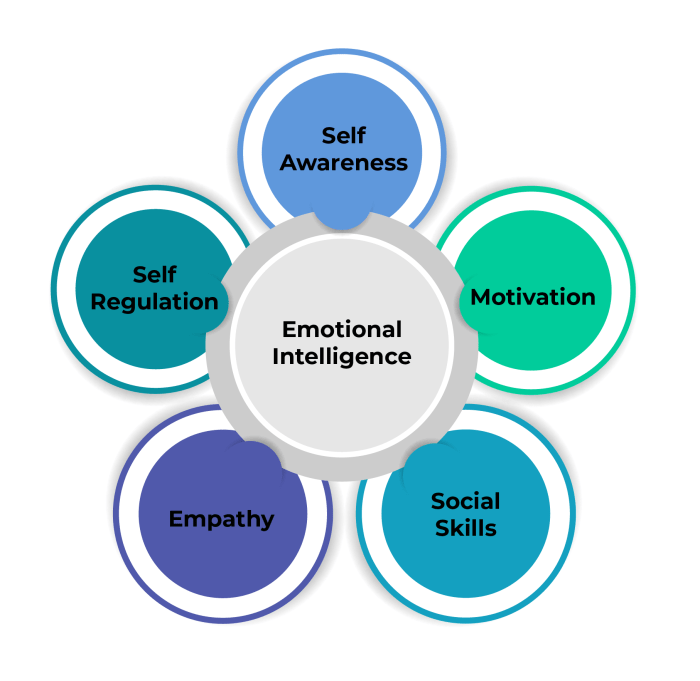
Emotional intelligence, often referred to as EQ, is the ability to recognize, understand, and manage our emotions while also being able to empathize with others. This essential skill can significantly impact both our personal and professional lives, influencing how we communicate, resolve conflicts, and build relationships. By developing emotional intelligence, individuals can navigate social complexities more effectively, leading to more fulfilling interactions and improved well-being.
In this exploration of emotional intelligence, we will break down its key components, discuss strategies for enhancing these skills, and highlight how emotional intelligence can be a powerful tool in personal development and mental well-being. From self-awareness to empathy, understanding emotional intelligence opens doors to a richer, more connected life.
Understanding Emotional Intelligence
Emotional intelligence (EI) is the ability to recognize, understand, and manage our own emotions, as well as the emotions of others. This concept is crucial not only in personal development but also in professional settings, where interpersonal relationships can significantly impact success. High emotional intelligence fosters better teamwork, enhances communication, and leads to more effective leadership.The significance of emotional intelligence lies in its influence on our decision-making processes and how we navigate social complexities.
Individuals with high EI are more adept at handling stress, resolving conflicts, and empathizing with others, which fosters healthier relationships both in personal life and the workplace.
Key Components of Emotional Intelligence
Emotional intelligence consists of several key components that work together to enhance our ability to connect with others and manage our own emotions. Understanding these components is essential to developing emotional intelligence over time. The five main components are:
- Self-Awareness: This is the ability to recognize and understand your own emotions, strengths, weaknesses, and values. Self-awareness allows individuals to assess themselves accurately and gain insights into how their feelings affect their behavior. A person high in self-awareness would be able to identify when they are stressed and understand the underlying reasons for it.
- Self-Regulation: This involves managing your emotions in a healthy way. Individuals who can regulate their emotions are less likely to react impulsively and can adapt to changing circumstances. For example, a leader who maintains composure during a crisis can make better decisions that benefit the team.
- Motivation: This refers to the inner drive to pursue goals with energy and persistence. Emotionally intelligent people are generally motivated by more than just external rewards; they often seek personal growth and fulfillment. For instance, someone passionate about their work will go above and beyond to achieve success, driven by their intrinsic motivation.
- Empathy: Empathy is the ability to understand the emotions of others and respond appropriately. This skill is vital for creating strong relationships, as it allows one to connect with others on a deeper level. For example, a manager who practices empathy can better support their team members during challenging times by recognizing their feelings and offering assistance.
- Social Skills: This encompasses a wide range of abilities needed to manage relationships effectively. Strong social skills involve not only effective communication but also the ability to inspire, influence, and work collaboratively with others. Individuals skilled in this area can navigate social situations with ease, fostering positive interactions and resolving conflicts amicably.
Impact of Emotional Intelligence on Relationships and Communication
Emotional intelligence has a profound impact on the dynamics of both personal and professional relationships. It enhances communication by enabling individuals to express their thoughts and feelings clearly while also understanding the emotional cues of others. When people are aware of their own emotions and can empathize with those around them, they are better equipped to engage in meaningful conversations, leading to stronger connections.In professional environments, emotionally intelligent individuals tend to have better teamwork capabilities.
They can navigate different personalities and conflicts more effectively, leading to heightened collaboration. For instance, teams led by emotionally intelligent leaders often experience higher morale and productivity, as these leaders are skilled at recognizing and addressing the emotional needs of their team members.Moreover, good emotional intelligence fosters a culture of open communication. In organizations where emotional intelligence is valued, employees feel safe to express their ideas and emotions without fear of judgment.
This openness not only enhances innovation but also encourages a sense of belonging among team members, ultimately contributing to the overall success of the organization.
“Emotional intelligence is the key to both personal and professional success.”
Developing Emotional Intelligence Skills

Enhancing emotional intelligence is a transformative journey that allows individuals to connect with themselves and others on a deeper level. By focusing on self-awareness, self-regulation, empathy, and social skills, one can navigate life’s challenges more effectively. Below is a guide that Artikels essential steps and methods for developing these skills.
Enhancing Self-Awareness and Self-Regulation
Self-awareness and self-regulation are foundational components of emotional intelligence. Improving these skills involves recognizing your emotions, understanding their impact, and managing them effectively. Here’s a step-by-step guide to enhance these abilities:
1. Practice Mindfulness
Set aside time daily for mindfulness activities such as meditation, deep breathing, or journaling. This helps in recognizing your emotional state and triggers.
2. Reflect on Emotional Responses
After experiencing strong emotions, take a moment to analyze what triggered them and how you responded. Keeping a journal can assist with this reflection.
3. Seek Feedback
Encourage others to provide honest feedback about your behavior and emotional responses in different situations. This can help in identifying blind spots.
4. Set Goals for Self-Regulation
Identify situations where emotional responses can be improved, and set specific goals to manage those emotions better. For instance, practice taking deep breaths before reacting in stressful scenarios.
5. Develop Coping Strategies
Learn and utilize techniques such as cognitive restructuring to challenge negative thoughts and emotional responses.
Improving Empathy and Social Skills
Empathy and social skills are essential for building strong relationships and navigating social situations effectively. Here are methods to enhance these areas:
1. Active Listening
Focus on listening without interrupting. Show interest through body language and by summarizing what the other person has said to ensure understanding.
2. Put Yourself in Others’ Shoes
Make a conscious effort to consider the feelings and perspectives of others in various situations. This can foster deeper connections and understanding.
3. Observe Non-Verbal Cues
Pay attention to body language, facial expressions, and tone of voice. These can provide insight into someone’s emotional state and can guide your response.
4. Engage in Community Service
Volunteering for causes you care about can enhance your empathy by exposing you to diverse experiences and perspectives.
5. Practice Conflict Resolution
Engage in role-playing scenarios where you practice resolving conflicts with empathy. This helps in developing social skills and improves your ability to navigate difficult conversations.
Managing Emotions in Stressful Circumstances
Effectively managing emotions during stress is crucial for maintaining composure and making sound decisions. Here are techniques to manage emotions in challenging situations:
1. Identify Stress Triggers
Recognize specific situations or interactions that trigger stress and emotional responses. This awareness can help in preparing for future encounters.
2. Use Grounding Techniques
Grounding techniques such as the 5-4-3-2-1 method (identifying five things you see, four you can touch, three you hear, two you smell, and one you taste) can help to center your thoughts and alleviate overwhelming feelings.
3. Implement Time-Outs
In high-stress situations, take time-outs to calm down before responding. This can be as simple as stepping away from the situation or taking deep breaths.
4. Reframe Negative Thoughts
Challenge negative thinking patterns by reframing them into positive or constructive thoughts. Instead of thinking, “I can’t handle this,” try, “This is a challenge, but I can manage it.”
5. Practice Self-Compassion
Acknowledge that feeling stressed is a common experience. Be kind to yourself and recognize that it’s okay to struggle sometimes.
“Emotional intelligence is not just about recognizing your own feelings; it’s about understanding the feelings of those around you, too.”
Emotional Intelligence in Self-Help

Emotional intelligence (EI) plays a significant role in personal development, enabling individuals to understand and manage their emotions effectively. By harnessing EI, people can enhance their self-awareness, improve their relationships, and foster resilience. Incorporating emotional intelligence into self-help practices empowers individuals to overcome challenges and reach their full potential.Utilizing emotional intelligence in personal development practices involves a conscious effort to recognize and regulate emotions while also empathizing with others.
This understanding promotes better communication, improved conflict resolution, and stronger interpersonal connections. As individuals work on their emotional intelligence, they develop skills that contribute not only to their personal lives but also to their professional growth.
Self-Help Exercises to Increase Emotional Intelligence
Engaging in specific self-help exercises can significantly boost emotional intelligence. These activities encourage introspection, enhance emotional awareness, and foster empathy. Here is a list of effective exercises that can be incorporated into your self-help routine:
- Journaling: Regularly writing about your emotions and experiences helps in identifying patterns and triggers, thereby increasing self-awareness.
- Mindfulness Meditation: Practicing mindfulness aids in staying present and recognizing emotional responses without judgment, promoting emotional regulation.
- Active Listening: Engaging in conversations with full attention and empathy enhances understanding and strengthens relationships.
- Role-Playing Scenarios: Practicing various social situations helps in developing empathy and communication skills.
- Emotion Regulation Techniques: Learning strategies such as deep breathing, cognitive restructuring, or visualization can help manage intense emotions effectively.
These exercises not only contribute to emotional intelligence but also support overall mental well-being, equipping individuals with tools to navigate life’s challenges.
Emotional Intelligence and Mental Well-Being
The relationship between emotional intelligence and mental well-being is profound. High emotional intelligence can lead to better stress management, improved self-esteem, and enhanced coping mechanisms. When individuals are attuned to their emotions and those of others, they can address stressors more effectively.Incorporating stress reduction strategies is essential for maintaining mental health. Here are several strategies closely linked to emotional intelligence that can aid in stress management:
- Identifying Triggers: Understanding what situations elicit stress allows individuals to prepare or avoid them, reducing anxiety levels.
- Developing Coping Strategies: Creating a toolbox of healthy coping mechanisms, such as physical activity or creative outlets, helps in managing emotional responses.
- Building Support Networks: Establishing connections with supportive friends or family can provide essential emotional resources during stressful times.
- Practicing Gratitude: Regularly acknowledging positive aspects of life enhances overall mood and decreases stress, fostering resilience.
- Setting Boundaries: Learning to say no and establishing personal limits can prevent burnout and maintain emotional balance.
By actively working on emotional intelligence, individuals not only improve their personal development but also enhance their overall mental well-being, leading to a more fulfilling life.
Summary

In conclusion, emotional intelligence is not just a buzzword; it’s a vital part of achieving personal growth and fostering healthier relationships. By investing time in understanding and developing our emotional intelligence, we pave the way for improved communication, deeper connections, and enhanced emotional resilience. Embracing these skills can lead to a more balanced and fulfilling life, both personally and professionally.
Answers to Common Questions
What are the benefits of emotional intelligence?
Improved relationships, better communication, and effective conflict resolution are some of the key benefits of high emotional intelligence.
Can emotional intelligence be developed?
Yes, emotional intelligence can be learned and improved over time through practice and self-reflection.
How does emotional intelligence differ from IQ?
While IQ measures cognitive abilities and intelligence, emotional intelligence focuses on emotional awareness and interpersonal skills.
Is emotional intelligence important in the workplace?
Absolutely! Emotional intelligence is crucial in the workplace as it enhances teamwork, leadership abilities, and workplace morale.
What role does empathy play in emotional intelligence?
Empathy is a core component of emotional intelligence, enabling individuals to understand and connect with the feelings of others.





